At 2:44 am on Tuesday 5th February, Ocado’s high-tech Hampshire-based customer fulfilment centre caught fire. Firefighters have been working to control the blaze, and were still dealing with the fire two days after it started.
As the centre can manage up to 65,000 customer orders per week, customers have seen their orders cancelled in the wake of the emergency. Ocado’s share price fell 5.2% on Wednesday 6th and dropped another 9.1% after it stated that the fire would damage forecasted sales growth.
Local residents faced disruption, as some had to leave their homes.
There will be weeks of clean up ahead, and months of investigation into why the fire happened and how it spread (especially as Ocado won an award in 2018 for the centre’s fire risk management systems).
But, one thing that stands out right now is the overwhelming support that the brand is receiving from people. For the most part, customers understand why their orders are being cancelled, and social media is full of people offering support and good wishes
So, how has Ocado been able to manage this incident so well? What can other brands take away from its experience?
1. Don’t underestimate the importance of community support
Like any major food retailer, Ocado isn’t always perfect and its social media teams often have to manage customer queries and complaints, but it tends to rank as one of the best online supermarkets and is usually quite responsive when customers contact them.
However, even if customers are generally satisfied at the best of times, the brand has to ensure that it communicates the facts clearly during a crisis. (And while some crises allow brands to be a bit slower in confirming facts, when something happens that affects food deliveries, facts need to be communicated as quickly as possible.
Ocado hasn’t been using Facebook to communicate, but it has been talking to customers over Twitter. At first, it looked like the social media team couldn’t be clear about the issue. Some customers found this annoying.
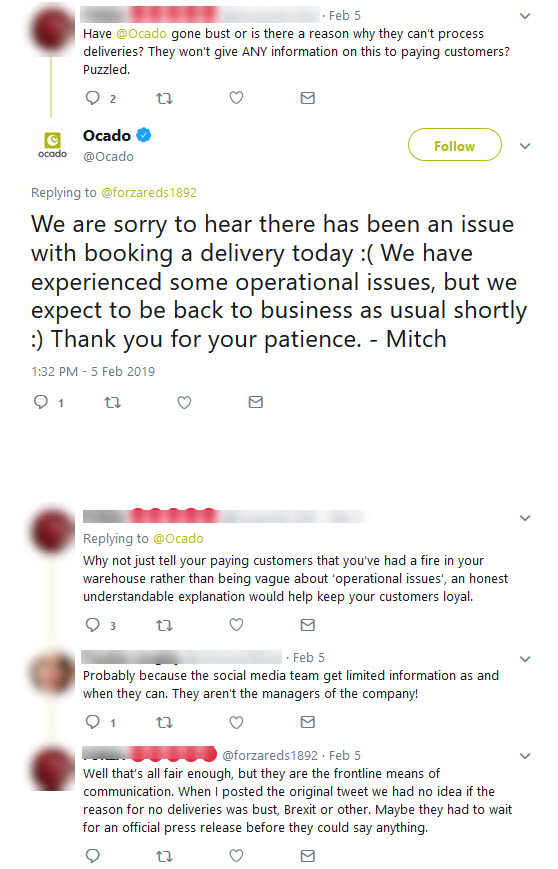
But the social media team snapped into action very quickly and started replying to customer questions about orders and updates.


The team didn’t post general updates about the situation until the second day of the fire:
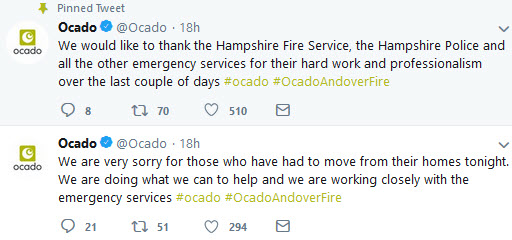
But these messages showed that the brand understood the impact that the fire was having on people.
It also had the support of local businesses who helped provide food for the firefighters.
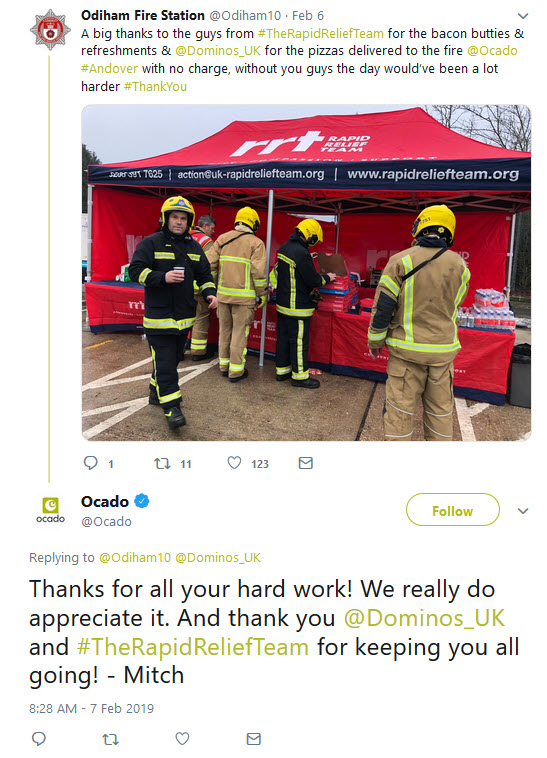
It can be difficult to stay on top of everything in a crisis, sometimes you may be so focused on responding to individual customers and the media that you forget to keep the world updated with what the brand is doing to help behind the scenes. This is where having a strong community of customers, employees, business partners and other people can really help spread the word.
2. Do what you can to mitigate the effect that the incident has on others
As the BBC reported, Ocado provided hotels for local residents who needed to evacuate (those that didn’t or couldn’t stay with friends or family).
Customers came to the brand’s defence as others posted more critical comments, with one sharing a tweet that Ocado had posted about supplying residents who had been evacuated from their homes:
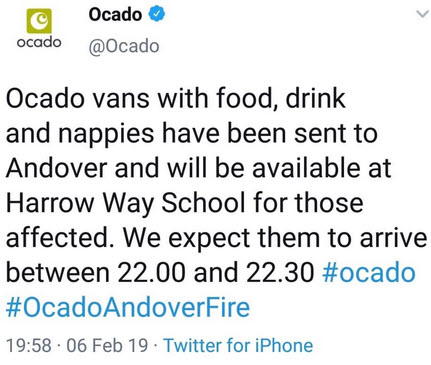
On the 7th, the local MP posted an update to his Facebook page highlighting the community effort and bringing attention to how Ocado was supporting its employees.
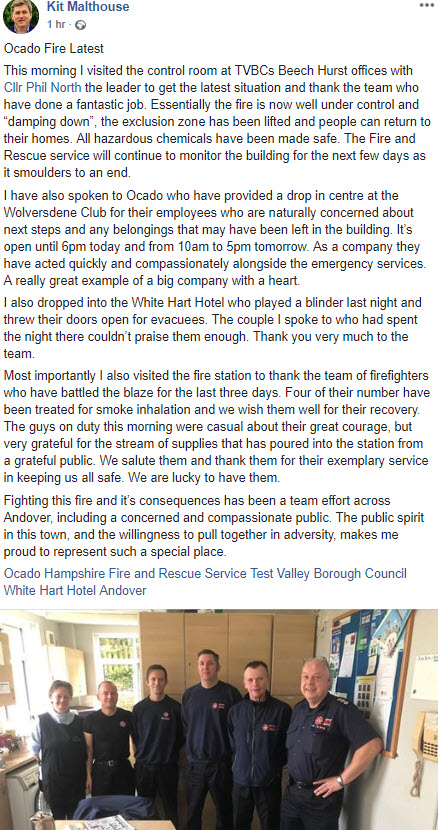
A crisis may not be the brand’s fault. It could be the result of an accident, or the fault of a third-party provider; it doesn’t matter. All people know is that an emergency is in progress and it’s connected to your brand.
Sometimes organisations can be so concerned with the implications of apologising, let alone helping, that they don’t respond at all. In it’s response to this fire, Ocado has shown that there’s power in kindness and in doing the right thing.
3. Let your team be authentic
Empathy is an important element in social media management anyway, but it’s crucial during a crisis.
In the case of Ocado, the fulfilment centre fire would have woken local residents up in the middle of the night. They may have been forced to leave their homes, and had days of disruption
Customers who had placed orders with Ocado may have had their deliveries cancelled, which causes some level of frustration for them.
While, thankfully, no one was hurt in the fire, employees will still be worried about their jobs
People aren’t always at their best in a crisis. But the business has to be. It’s not the time for cold, corporate statements and weak-willed platitudes.
Ocado’s social media team has been doing a great job of responding to people on Twitter in a genuine, empathetic way. They’ve responded to people as individuals, rather than blasting out a copy-and-paste of a prepared statement. They’ve also been grateful for the support that people have been offering, which has gone a long way to building a strong connection during the crisis.
It’s impossible for a brand to deal with a crisis perfectly. There will always be things that could have been done better. What Ocado is showing right now is that when you work hard to manage your community in the good times, your brand will have a strong support network when things go wrong. It’s showing that by being human, and doing what’s right, most people will stand with the brand and help it get through the bad times.
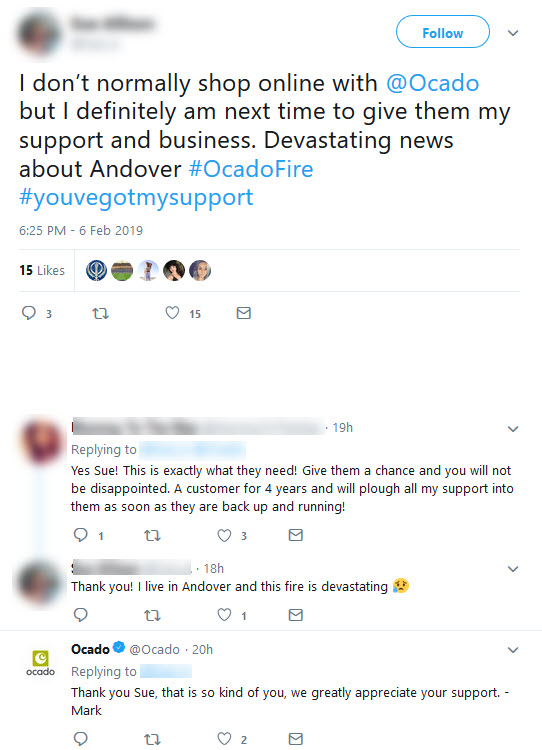
Feature image by Kupono Kuwamura on Unsplash








